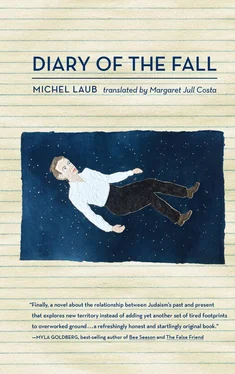Michel Laub
Diary of the Fall
A FEW THINGS I KNOW ABOUT MY GRANDFATHER
1.
My grandfather didn’t like to talk about the past, which is not so very surprising given its nature: the fact that he was a Jew, had arrived in Brazil on one of those jam-packed ships, as one of the cattle for whom history appears to have ended when they were twenty, or thirty, or forty or whatever, and for whom all that’s left is a kind of memory that comes and goes and that can turn out to be an even worse prison than the one they were in.
2.
In my grandfather’s notebooks, there is no mention of that journey at all. I don’t know where he boarded the ship, if he managed to get some sort of documentation before he left, if he had any money or at least an inkling of what awaited him in Brazil. I don’t know how long the crossing lasted, whether it was windy or calm, whether they were struck by a storm one night in the early hours, whether he even cared if the ship went down and he died in what would seem a highly ironic manner, in a dark whirlpool of ice and with no hope of being remembered by anyone except as a statistic — a fact that would sum up his entire biography, swallowing up any reference to the place where he had spent his childhood and the school where he studied and everything else that had happened in his life in the interval between being born and the day he had a number tattooed on his arm.
3.
I don’t want to talk about it either. If there’s one thing the world doesn’t need it’s to hear my thoughts on the subject. It’s been dealt with in the cinema. It’s been dealt with in books. Eyewitnesses have already recounted the story detail by detail, and there are sixty years of reports and essays and analyses, generations of historians and philosophers and artists who devoted their lives to adding footnotes to all that material in an effort to refresh yet again the world’s views on the matter, the reflex reaction everyone has to the word Auschwitz , so not for a second would it occur to me to repeat those ideas if they were not, in some way, essential if I am to talk about my grandfather and, therefore, about my father and, therefore, about myself.
4.
In the months prior to my thirteenth birthday I was studying to prepare for my bar mitzvah. Twice a week I went to the house of a rabbi. There were six or seven of us in the class, and we each took home with us a tape on which he had recorded extracts from the Torah sung by him. By the next class we were expected to know the whole thing by heart, and even today I can still sing that fifteen- or twenty-minute mantra without understanding a single word.
5.
The rabbi lived on his salary from the synagogue and on contributions from the families who attended. His wife had died and he had no children. During class he drank tea with sweetener in it. Shortly after the class began, he would pick on one of the students, usually the one who hadn’t done his homework, sit down beside him, speak to him with his face almost pressed to his, and make him sing each line and syllable over and over, until the student got it wrong for the second or third time, then the rabbi would thump the table and shout and say that he wouldn’t bar mitzvah any of us.
6.
The rabbi had long fingernails and smelled of vinegar. He was the only rabbi in the city who gave those preparatory classes. After the class, we would often have to wait in the kitchen while he talked to our parents, telling them how indifferent, undisciplined, ignorant and aggressive we were, and after this speech he would always ask them for a little more money. It often happened, too, that one of the students, knowing the rabbi had diabetes and had already spent time in hospital, where, due to complications, he had almost ended up having one of his legs amputated, that this student would offer to make him another cup of tea, adding sugar this time instead of sweetener.
7.
Almost all my schoolfriends were bar mitzvahed. The ceremony always took place on a Saturday morning. The birthday boy would wear the tallit and be called upon to pray along with the adults. Then there would be a lunch or a dinner, usually held in some posh hotel, and one of my schoolfriends’ favorite tricks was to put shoe polish on the door handles of the rooms. Another favorite trick was to pee in the boxes of hand towels provided in the gentlemen’s toilets. There was another trick too, although it only happened once, when it was time to sing “Happy Birthday,” and because that particular year it had become the custom to give the birthday boy the bumps, tossing him into the air thirteen times, with a group of boys catching him as he fell, like a fireman’s safety net — except that on the day in question the net disappeared on the thirteenth fall and the birthday boy crashed to the floor.
8.
The party where this happened wasn’t held at a posh hotel, but in the reception room of a building without a lift or a porter, because the birthday boy was also a scholarship boy and the son of a bus conductor who had once been spotted selling cotton candy in the park. The birthday boy had never had to resit a single subject, had never been to any parties, never been involved in a riot in the library, nor was he among the students who put a slab of raw meat in a female teacher’s handbag, and he certainly wasn’t amused when someone left a bomb behind the toilets, a bag of gunpowder attached to a lit cigar. When he fell he bruised a vertebra, had to stay in bed for two months, wear an orthopedic corset for a further few months and go to a physiotherapist during the whole of that time, on top of being taken to hospital and having his party end in a general atmosphere of perplexity, at least among the adults present — and one of the boys who should have caught him was me.
9.
A Jewish school, at least a school like ours, in which some students are dropped off in a chauffeur-driven car and others spend years being ridiculed, one of them having his packed lunch spat in every day, another being locked in the machine room during every break-time, and the student who was injured during his birthday party had already been the victim of such pranks, having in previous years been repeatedly buried in the sand — yes, a Jewish school is much like any other. The difference being that you spend your childhood being told about anti-Semitism: some teachers talk of little else, as a way of explaining the atrocities committed by the Nazis, which were a consequence of the atrocities committed by the Poles, which were an echo of the atrocities committed by the Russians, and you could add to this list the Arabs, the Muslims, the Christians and anyone else you care to name, a spiral of hatred that had its roots in feelings of envy for the intelligence, willpower, culture and wealth that the Jews had created despite all those obstacles.
10.
When I was thirteen, I lived in a house with a swimming pool, and in the summer holidays I went to Disney World and rode on Space Mountain, saw the Pirates of the Caribbean and the parade and the fireworks, and afterward visited the Epcot Center and saw the dolphins at Sea World and the crocodiles in Cypress Gardens and the river rapids in Busch Gardens and the vampire mirrors in the Mystery Fun House.
11.
When I was thirteen I had: a video game, a VCR, a shelf full of books and records, a guitar, a pair of roller skates, a NASA uniform, a stolen No Parking sign, a tennis racket I never used, a tent, a skateboard, a rubber ring, a Rubik’s cube, a knuckleduster, and a small penknife.
Читать дальше












